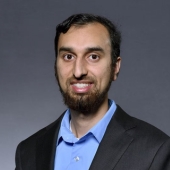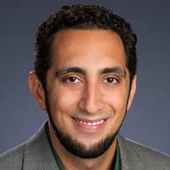Nicholas Diakopoulos
School of Communication
View Bio
Nicholas Diakopoulos is a Professor of Communication Studies and Computer Science (by courtesy). He directs the Computational Journalism Lab and is the Director of Graduate Studies for the Technology and Social Behavior PhD program. His research focuses on computational journalism, including aspects of automation and algorithms in news production, algorithmic accountability and transparency, and social media in news contexts. He is the author of the award-winning book Automating the News: How Algorithms are Rewriting the Media, published by Harvard University Press.
Jennifer Dunn
McCormick School of Engineering
View Bio
Jennifer Dunn is Professor of Chemical and Biological Engineering and (by courtesy) Mechanical Engineering. She is also the Director of the Center for Engineering Sustainability & Resilience. She studies emerging technologies, their energy and environmental impacts, and their potential to influence air pollutant and greenhouse gas emissions, water consumption, and energy consumption at the economy-wide level. Particular technologies of interest include biofuels and bioproducts, automotive lithium-ion batteries, fuels, and chemicals made from carbon capture and utilization technologies and from natural gas liquids, and resource recovery from wastewater. She applies life cycle analysis as a key tool to evaluate emerging technologies.
Mark Hauser
Weinberg College of Arts & Sciences
View Bio
Wendy Pearlman
Weinberg College of Arts & Sciences
View Bio
Wendy Pearlman is the Jane Long Professor of Arts and Sciences and a professor of political science. She also serves as Co-Editor-in-Chief of the journal Perspectives on Politics. A scholar of Middle East politics, social movements, conflict processes, and forced migration, she is the author of six books and more than 40 journal articles or book chapters. Occupied Voices: Stories of Everyday Life from the Second Intifada (Nation Books, 2003), a collection of interviews from Palestinians in the West Bank and Gaza Strip, was a Boston Globe and Washington Post bestseller. Violence, Nonviolence, and the Palestinian National Movement (Cambridge University Press, 2011), named one of Foreign Policy’s best books on the Middle East in 2011, examines Palestinian’s twentieth-century history to consider how a self-determination movement’s internal organizational cohesion or fragmentation affects its strategies of protest. Triadic Coercion: Israel’s Targeting of States That Host Nonstate Actors (co-authored with Boaz Atzili, Columbia University Press, 2018) examines the causes and consequences of 70 years of Israel’s use violence and/or threats against neighboring states to prevent or punish their support for nonstate actors on their territory. Since 2012, Wendy has also conducted interviews with more than 500 displaced Syrians on five continents. She shares these voices in two books. We Crossed a Bridge and it Trembled: Voices from Syria (HarperCollins, 2017) is a curation of testimonials and poetic fragments that chronicle and explain the Syrian experience of authoritarianism, revolution, and war. It ends with the forced migration of millions of Syrian refugees. The Home I Worked To Make: Voices from the New Syrian Diaspora (Liveright Books, 2024), is a second collection of personal stories. Taking Syria’s refugee outflow as its point of departure, it shares and explores Syrians’ stories and reflections on losing home, searching for home, and rethinking the meaning of home.
Hatim Rahman
Kellogg School of Management
View Bio
Hatim A. Rahman is an Associate Professor of Management and Organizations and Sociology (by courtesy). He is also PepsiCo Chair in International Management. His research investigates how artificial intelligence is impacting the nature of work and employment relationships in organizations and labor markets. His research and teaching have received numerous awards, including the National Science Foundation CAREER award. In 2023, he was named as one of the best 40 business school professors under 40 years of age by Poets & Quants. His award-winning book, Inside the Invisible Cage: How Algorithms Control Workers (University of California Press), investigates how digital labor platform organizations use algorithms to control workers' job opportunities. The book won the 2025 George R. Terry Book Award by the Academy of Management, was selected as the 2025 Responsible Research in Management Award Distinguished Winner, won the 2025 McGannon Book Award Winner, was a finalist for the EGOS Book Award, and earned a Silver Medal from the Axiom Business Book Award in the "Independent Thought Leadership" category. Professor Rahman's research has been published in Administrative Science Quarterly, Academy of Management Journal, Organization Science, Academy of Management Annals, and Academy of Management Discoveries. These articles have been recognized for both their theoretical and empirical impact by the National Science Foundation, Academy of Management, Responsible Research for Business and Management, Labor and Employment Relations Association, Thinkers50, Financial Times, Industry Studies Association, International Labour and Employment Relations Association, Psychology of Technology Institute, and International Conference on Information Systems.
Peter Slevin
Medill School of Journalism, Media, Integrated Marketing Communications
View Bio
Faith Summersett-Williams
Feinberg School of Medicine
View Bio
Sepehr Vakil
School of Education & Social Policy
View Bio








